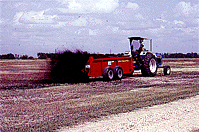Land Application of Biosolids
Biosolids Application on Farmland
The beneficial use of biosolids for growth of crops can significantly increase a farmer’s profit through fertilizer cost savings and improved crop growth and yield. Biosolids provide essential nutrients and micronutrients and may reduce or eliminate the need for chemical nutrient addition in deficient soils. The percent by weight of nutrients in biosolids varies from approximately 0.2 to 5 percent.
Value of 5-10 Dry Tons per Acre of a Typical
Anaerobically Digested Dewatered Biosolids Applied to a Farmland
| Nutrient | lbs/Acre Applied | Value/Acre |
| Nitrogen | 150 | $ 30.00 |
| Phosphorous (P2O5) | 150 | $ 30.00 |
| Potassium (K2O) | 10 | $ 1.00 |
| Copper (Cu) | 7 | $ 14.00 |
| Zinc (Zn) | 10 | $ 12.50 |
| Sulfur | 20 | $ 10.00 |
| Lime | 1 ton | $ 28.00 |
| Spreading | $ 15.00 | |
|
Total Value* |
$ 140.00 | |
Source: EPA Publication 832-R-94-009
Biosolids Application on Rangeland
After decades of grazing and wind erosion, rangeland can become deficient in nutrients and organic matter. Biosolids application to rangeland has the beneficial effect of increasing productivity by supplying nitrogen, other plant nutrients, and organic matter to soils. It increases forage production, groundcover, water retention, and improves soil quality. Surface application without incorporation is best because it does not disturb the existing plant community’s root zone and minimizes disturbance to the surface and soil structure.

Specialized equipment is used to apply biosolids on farmland and rangeland. When applied to farmland, the soil is turned to mix in the biosolids. For rangeland, surface application without incorporation is best.